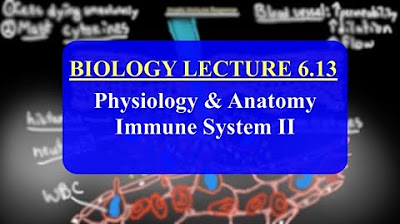Specific (Adaptive) Immunity | Humoral and Cell-Mediated Responses
Summary
TLDRThis script delves into the intricacies of the human immune system, focusing on specific or adaptive immunity. It explains how the body recognizes and combats pathogens using antigens, macrophages, T helper cells, and B cells, leading to the production of antibodies. The process highlights the development of humoral and cell-mediated responses, as well as the formation of memory cells to provide long-term immunity against future infections. The educational narrative is interspersed with humor, making complex biological concepts accessible and engaging.
Takeaways
- 🤒 The speaker discusses feeling sick, likely due to a virus or bacteria that bypassed their innate immune defenses.
- 🛡️ The video focuses on specific immunity or adaptive immunity, which is the immune system's way of learning to fight off specific pathogens.
- 🦠 Pathogens, like bacteria or viruses, have unique antigens on their surfaces that the immune system can learn to recognize.
- 🍽️ Macrophages are big eater cells that consume pathogens and present their antigens on the surface to alert the immune system.
- 🧬 T helper cells recognize the antigens presented by macrophages and clone themselves to fight off the specific pathogen.
- 💉 B cells, which mature in the bone marrow, produce antibodies that are specific to the pathogen and help neutralize it.
- 💧 The humoral response involves B cells producing antibodies in the body's fluids, such as blood and lymphatic system.
- ⚔️ Cytotoxic T cells target and kill infected cells by detecting antigens on their surface and releasing destructive chemicals.
- 🔄 Memory B cells and memory T cells remain in the body to quickly respond if the same pathogen invades in the future.
- 🧪 The video provides an overview of how the body transitions from a non-specific immune response to a specific immune response, ensuring better protection against future infections.
Q & A
What is the primary focus of this video?
-The primary focus of this video is to explain specific immunity or adaptive immunity, which involves the immune system learning how to fight off a particular pathogen.
What are antigens, and why are they important?
-Antigens are proteins on the surface of pathogens that help the immune system identify the pathogen. Recognizing antigens allows the immune system to target and fight off specific bacteria or viruses.
What role does a macrophage play in the immune response?
-A macrophage is a type of white blood cell that engulfs and digests pathogens through a process called phagocytosis. It then presents the antigens from the pathogen on its surface to help other immune cells recognize and fight the invader.
What is the significance of the Major Histocompatibility Complex 2 (MHC2)?
-MHC2 is a protein found on the surface of macrophages that presents antigens to T helper cells. This process is crucial for activating the specific immune response by allowing T cells to recognize and respond to the pathogen.
How do T helper cells contribute to the immune response?
-T helper cells recognize the antigens presented by macrophages and then clone themselves to produce more cells that can identify the pathogen. They also release cytokines, which activate other immune cells, including B cells and cytotoxic T cells.
What is the function of B cells in the immune system?
-B cells produce antibodies that specifically target the pathogen identified by the immune system. These antibodies neutralize the pathogen and make it easier for other immune cells to destroy it.
Why is it important for B cells to be specific in the antibodies they produce?
-Specificity is crucial because if B cells produced antibodies that targeted any protein, they could mistakenly attack the body's own healthy cells. The specificity ensures that only the pathogen is targeted.
What are memory B cells, and what is their role in immunity?
-Memory B cells are long-lived cells that remain in the body after an infection. They are ready to respond quickly if the same pathogen invades the body again, providing immunity to future infections by that pathogen.
How does the immune system handle cells that are already infected by a pathogen?
-Infected cells present antigens on their surface, signaling for help. Cytotoxic T cells recognize these antigens and release perforins and enzymes that kill the infected cells, preventing the pathogen from replicating and spreading.
What is the difference between humoral and cell-mediated immune responses?
-The humoral response involves B cells producing antibodies to neutralize pathogens in body fluids like blood. The cell-mediated response involves T cells killing infected cells to stop the spread of intracellular pathogens like viruses.
Outlines

このセクションは有料ユーザー限定です。 アクセスするには、アップグレードをお願いします。
今すぐアップグレードMindmap

このセクションは有料ユーザー限定です。 アクセスするには、アップグレードをお願いします。
今すぐアップグレードKeywords

このセクションは有料ユーザー限定です。 アクセスするには、アップグレードをお願いします。
今すぐアップグレードHighlights

このセクションは有料ユーザー限定です。 アクセスするには、アップグレードをお願いします。
今すぐアップグレードTranscripts

このセクションは有料ユーザー限定です。 アクセスするには、アップグレードをお願いします。
今すぐアップグレード関連動画をさらに表示

(209) Inflammation, B cells and Antibodies

Types of immune responses: Innate and adaptive, humoral vs. cell-mediated | NCLEX-RN | Khan Academy

Immune System

IMAT Biology Lesson 6.13 | Anatomy and Physiology | Immune System Part II

SISTEM PERTAHANAN TUBUH - BIOLOGI KELAS 11 SMA

IMMUNOLOGY- Innate Immunity and Adaptive Immunity (FL-Immuno/01)
5.0 / 5 (0 votes)
